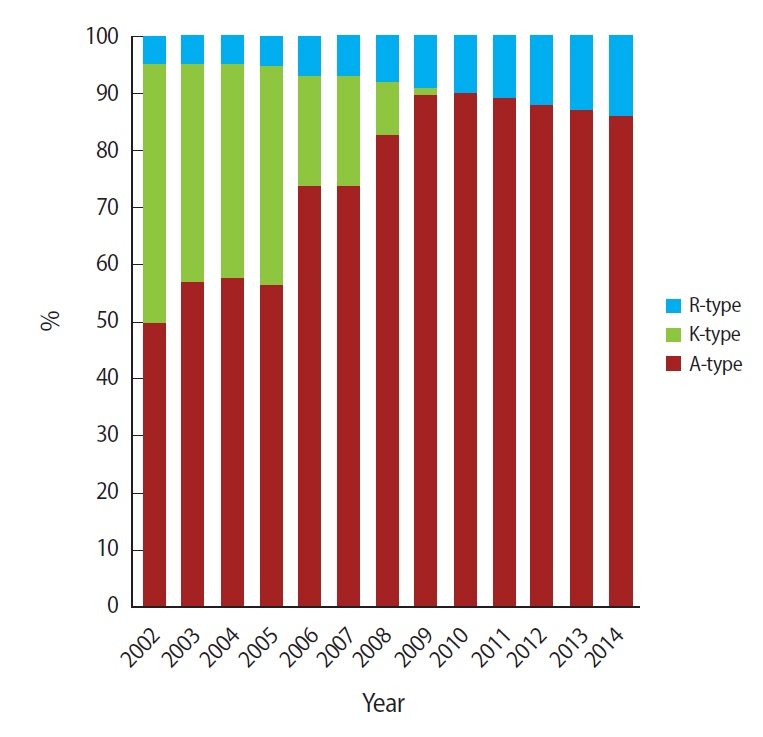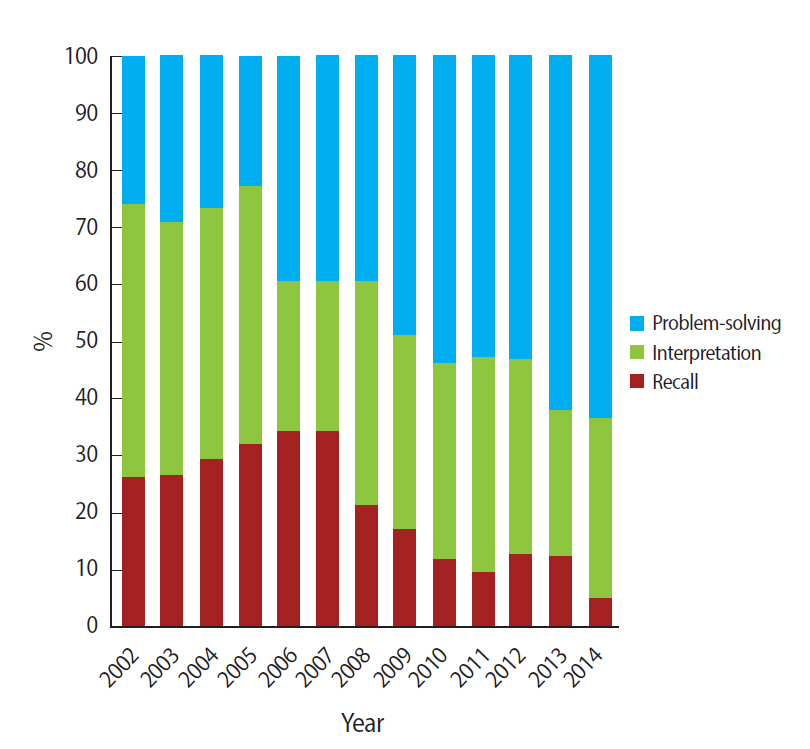Reforms of the Korean Medical Licensing Examination regarding item development and performance evaluation
- Affiliations
-
- 1National Health Personnel Licensing Examination Board, Seoul, Korea. mkyim@kuksiwon.or.kr
- KMID: 2402013
- DOI: http://doi.org/10.3352/jeehp.2015.12.6
Abstract
- PURPOSE
The Korean Medical Licensing Examination (KMLE) has undergone a variety of innovative reforms implemented by the National Health Personnel Licensing Examination Board (NHPLEB) in order to make it a competency-based test. The purpose of this article is to describe the ways in which the KMLE has been reformed and the effect of those innovations on medical education in Korea.
METHODS
Changes in the KMLE were traced from 1994 to 2014 by reviewing the adoption of new policies by the NHPLEB and the relevant literature.
RESULTS
The most important reforms that turned the examination into a competency-based test were the following: First, the subjects tested on the exam were revised; second, R-type items were introduced; third, the proportion of items involving problem-solving skills was increased; and fourth, a clinical skills test was introduced in addition to the written test. The literature shows that the above reforms have resulted in more rigorous licensure standards and have improved the educational environment of medical schools in Korea.
CONCLUSION
The reforms of the KMLE have led to improvements in how the competency of examinees is evaluated, as well as improvements in the educational system in medical schools in Korea.
MeSH Terms
Figure
Cited by 3 articles
-
Is there an agreement among the items of the Korean physical therapist licensing examination, learning objectives of class subjects, and physical therapists’ job descriptions?
Min-Hyeok Kang, Oh-Yun Kwon, Yong-Wook Kim, Ji-Won Kim, Tae-Ho Kim, Tae-Young Oh, Jong-Hyuk Weon, Tae-Sik Lee, Jae-Seop Oh
J Educ Eval Health Prof. 2016;13:3. doi: 10.3352/jeehp.2016.13.3.Medical students’ satisfaction with the Applied Basic Clinical Seminar with Scenarios for Students, a novel simulation-based learning method in Greece
Panteleimon Pantelidis, Nikolaos Staikoglou, Georgios Paparoidamis, Christos Drosos, Stefanos Karamaroudis, Athina Samara, Christodoulos Keskinis, Michail Sideris, George Giannakoulas, Georgios Tsoulfas, Asterios Karagiannis
J Educ Eval Health Prof. 2016;13:13. doi: 10.3352/jeehp.2016.13.13.Attitudes to proposed assessment of pharmacy skills in Korean pharmacist licensure examination
Joo Hee Kim, Ju-Yeun Lee, Young Sook Lee, Chul-Soon Yong, Nayoung Han, Hye Sun Gwak, Jungmi Oh, Byung Koo Lee, Sukhyang Lee, Sun Huh
J Educ Eval Health Prof. 2017;14:6. doi: 10.3352/jeehp.2017.14.6.
Reference
-
1. National Health Personnel Licensing Examination Board. Twenty years history of National Health Personnel Licensing Examination. Seoul: National Health Personnel Licensing Examination Board;2012.2. National Health Personnel Licensing Examination Board. Statistics annual report. Seoul: National Health Personnel Licensing Examination Board;2013.3. Yim MK, Huh S. Usability of extended-matching type items in the Korean Medical Licensing Examinations (2002, 2003). Korean J Med Educ. 2004; 16:219–226. http://dx.doi.org/10.3946/kjme.2004.16.2.219.
Article4. Kim KS. Introduction and administration of the clinical skill test of the medical licensing examination, Republic of Korea (2009). J Educ Eval Health Prof. 2010; 7:4. http://dx.doi.org/10.3352/jeehp.2010.7.4.
Article5. Park HK. The impact of introducing the Korean Medical Licensing Examination clinical skills assessment on medical education. J Korean Med Assoc. 2012; 55:116–123. http://dx.doi.org/10.5124/jkma.2012.55.2.116.
Article6. Kim SM, Park I, Chang HS, Park EC. Improvement in clinical performance of interns and residents through clinical skills assessment of the Korean Medical Licensing Examination. Korean J Med Educ. 2012; 24:329–338. http://dx.doi.org/10.3946/kjme.2012.24.4.329.
Article7. Hwang JY, Jeong HS. Relationship between the content of the medical knowledge written examination and clinical skill score in medical students. Korean J Med Educ. 2011; 23:305–314. http://dx.doi.org/10.3946/kjme.2011.23.4.305.
Article8. Chung MH. President’s address: research and development on computer-based testing and extension of clinical skill examination to a variety of fields. J Educ Eval Health Prof. 2013; 10:1. http://dx.doi.org/10.3352/jeehp.2013.10.1.
Article
- Full Text Links
- Actions
-
Cited
- CITED
-
- Close
- Share
- Similar articles
-
- Presidential address: Adoption of a clinical skills examination for dental licensing, implementation of computer-based testing for the medical licensing examination, and the 30th anniversary of the Korea Health Personnel Licensing Examination Institute
- Comparison of item analysis results of Korean Medical Licensing Examination according to classical test theory and item response theory
- Testing Unidimensionality and Goodness-of-fitness for the Application of Item Response Theory to the Korean Medical Licensing Examination
- Perceptions on item disclosure for the Korean medical licensing examination
- Presidential address: demonstration of the international leadership of the Korea Health Personnel Licensing Examination Institute, introduction of a clinical skills test to the Korean dental licensing examination, and strengthening of ethics items on licensing examinations



